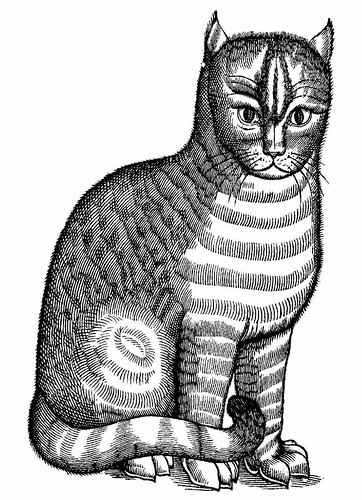.flickr-photo { border: solid 2px #000000; }.flickr-yourcomment { }.flickr-frame { text-align: left; padding: 3px; }.flickr-caption { font-size: 0.8em; margin-top: 0px; }
… or at least so it seemed to Shakespeare.
I’ve just been reading a fascinating article built around Falstaff’s response to the prince’s suggestion that the jolly gent might become the official hangman in Henry IV, Part 1.
Falstaff’s response is “I am as melancholy as a gib cat or a lugg’d bear …”
It seems odd, since melancholy is one of the last emotions I would have thought we’d be inclined to lay on cats today – haughty, perhaps, playful for kittens, sleepy for some – but not expressions of sadness. (Even if gib seems to have meant gelded.)
But the article puts up a convincing case that what is “bodily or emotional figuration for us, preserved metaphors of somatic consciousness, was the literal stuff of psychological theory for early modern scriptors of the body”. (p. 116)
Everything was made up of the four elements of earth, water, fire and air, and their linked qualities of cold, wet, hot and dry. Cats were cold, for as Edward Topsell, in the Historie of Four-Footed Beasts, 1607, from which the above image comes, said: “Cats are of divers colours, but for the most part gryself, like to congealed yse, which commeth from the condition of her meate.” (“Yse” I assume means “ice”, although please correct me if I’m wrong.)
“A cat’s melancholy is a humour – hence a temperature, a temperament, a disposition and a liquid of specific consistency organizing its relations to the world.” (p. 119)
As so if you think of “icy” as “haughty”, perhaps our two points of view are not so far apart.
(The lugg’d bear, by the way, was being dragged out to be baited by dogs, which gave it plentiful cause for melancholy.)
From “Melancholy cats, lugged bears and early modern cosmology: reading Shakespeare’s psychological materialism across the species barrier,” Gail Kern Paster, from Reading the Early Modern Passions: Essays in the Cultural History of Emotion, Paster, Owe and Floyd-Wilson, Uni of Penn. Press, 2004.


 About
About